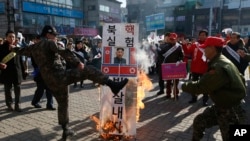A new government-sponsored survey found an increasing number of South Koreans view North Korea as an enemy.
The latest survey commissioned by South Korea’s Unification Ministry showed the number of South Koreans who hold negative views of the neighboring communist country has been growing over the past 10 years.
In 2015, 41 percent of respondents said they viewed North Korea as South Korea’s enemy, a significant jump from 15 percent in 2005.
The study said South Koreans’ view of North Korea appeared to become negative in 2010, when North Korea’s alleged attack on a South Korean navy ship took place, followed by North Korea’s shelling of a South Korean island. North Korea’s nuclear tests might have also contributed to the negative view, the study said.
The survey found that the negative view was higher among younger respondents than older respondents, which is contrary to a widespread perception that younger South Koreans are more likely than older South Koreans to hold a favorable view of North Korea.
More apathy
Lee Nae-young, a professor at Korea University in Seoul who led the study, said there appeared to be a growing feeling of apathy among younger South Koreans toward the North.
“It is worth noting that not only hostility but also apathy has grown. They are not in favor of engaging North Korea,” Lee said in reference to younger South Koreans’ view of North Korea.
The survey also found South Koreans’ support for President Park Geun-hye’s vision for unification had waned recently. In February 2014, Park said unification would bring an economic bonanza to her country. In 2014, 55 percent of South Koreans supported the idea, but that fell to 47 percent in the most recent poll.
Jeong Han-wool, a research fellow at the East Asia Institute, which conducted the survey, said the decline in support reflected South Koreans’ concern about the financial burden of unification.
The 1950-53 Korean War ended in a truce. The two countries technically are still at war.
Jee Abbey Lee contributed to this report.




